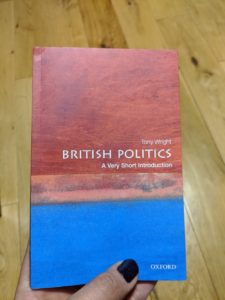British Politics: A Very Short Introduction by Tony Wright
Written by Ashley Kelmore, Posted in Reviews
Best for:
People who understand how British government should work in theory but want to know how it works in practice. It’s like British government 201.
In a nutshell:
Former Member of Parliament provides a very basic (though not basic enough for me) understanding of how the UK government works.
Worth quoting:
“Britain is rare among democratic states (only Israel and New Zealand belong to the same category) in not having a book of constitutional rules.”
Why I chose it:
I was looking for British government 101 – something more than what Wikipedia might tell me – after moving to the UK in 2018.
Review:
I earned a Political Science minor in college. I have two graduate-level degrees in public administration and public policy. I’ve spent 12 of the 16 years I’ve worked post-college in the public sector in the US. I share this because I want you to understand that I find government interesting from both a practical and a theoretical perspective, and have taken great pains to educate myself in this area.
But when I moved to the UK, I felt like I was back in kindergarten. As far as I could tell, UK government looked something like this: there’s the Queen, duh. And the Prime Minister. And the PM isn’t directly elected like the US President – they are the leader of a party that gets the most votes in Parliament at Westminster. And they need the Queen’s permission to form a government, but that’s, like, a formality, because she never says no. And if they step down, there isn’t a whole new election, there’s just this mini-election by the members of the party in power (no, not the Members of Parliament, the members of the party, which might be like .2% of the actual population).
Parliament sort of governs all of the UK. But maybe mostly England? Because Northern Ireland has a devolved government. So does Scotland. And apparently Wales? Does England have one then too? Are these nations, like US states, where they all have a government but there’s a bigger federal government that handles the messy bits like trade and war? No?
And then bills that become laws – it goes House of Commons (like the US House of Representatives), then the House of Lords (not at all like the US Senat), and then it has to be signed by the PM, right? Oh, no? Not even close? Cool. Cool cool cool.
Guys, even before the bizarre autumn of 2019, where the PM resigned, and there was a glimmer of hope that Labour might take over, and EU bills were all failing, I just wanted to know how it all works. I went to a bookstore and asked one of the kindly booksellers if they had anything like a UK Government 101 book to help me understand. Like, I’d be happy with something they give to 10-year-olds. [I tried Wikipedia, but it was both too much and not nearly enough information (though I guess England doesn’t have it’s own government? The hell?).] They were confused and seemed almost shocked at my request. But after much conversation amongst themselves, the booksellers suggested I order this one.
That’s a lot of information in what is meant to be a book review, but I provide it all so you get the context that even with this very short, pretty straightforward book, it was STILL too detailed for me. It’s brief indeed, but still gets into political machinations and workings that would make better sense if I understood how the UK government was, on paper, meant to work. And this doesn’t have it.
This seems like a great second half to a book that I am still in search of. I should probably have realized that it wouldn’t be quite right because it’s about British Politics, not British Government, but alas. Couldn’t he have included, like, a chart in the first two pages explaining things? Or even stick it in the back so readers who aren’t as ignorant of the topic as I am aren’t insulted? An appendix with a flow chart would have been useful.
Back to the bookstore (when it reopens) to see if I can get something else. Maybe this time I’ll tell them its for my imaginary 9-year-old niece.
Keep it / Pass to a Friend / Donate it / Toss it:
Keep it – some day I might get that 101 I’m desperate for, and then this will make more sense.

